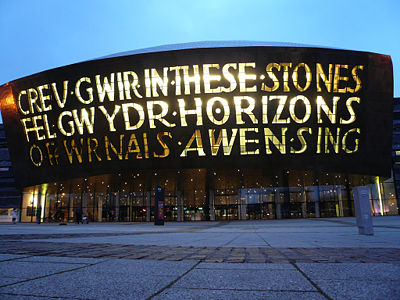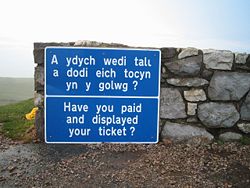Wales

The Wales Millennium Centre, Cardiff, is a well-known landmark of modern Wales today. In These Stones, Horizons Sing is a piece of music specially written by Karl Jenkins for the Centre's opening in 2004; reflecting the two languages of Wales, the Welsh poem by Gwyneth Lewis has its own message: Creu Gwir fel Gwydr o Ffwrnais Awen means 'creating truth like glass from inspiration's furnace'.[1]
Wales is today regarded as one of the four 'home nations' of the United Kingdom, situated in the west of the island of Great Britain, bordering England, with a population of about three million. For centuries, it was considered a 'principality' rather than a country because it was never a unified state, unlike Scotland - instead, Wales's history is a story of several Celtic kingdoms, invasion and rule by the English, the decline and rise of Welsh language and culture, and finally the emergence, at the close of the twentieth century, of a form of devolved representation unrivalled since the fifteenth, when Edward I brought Wales under English control.
Wales's modern capital is Cardiff, with nearby Swansea also a significant centre. Since the creation of the Welsh Assembly at Cardiff following a narrow 'yes' vote in 1999, Wales has carved out a distinct political identity for itself: its 60 Assembly members have some power to speak, vote and act on domestic matters. Unlike the Scottish Parliament, however, the Assembly has no power to create or amend legislation, nor determine taxation levels. This reflects Wales's different relationship with England from that of Scotland's: Wales's economy and people generally remain more committed to the union with the rest of the UK. Another reason is that, unlike in Scotland, Welsh nationalism is far more associated with speaking the Welsh language, and even with specific regions rather than the whole nation. North Wales and West Wales are the home of most Welsh speakers, with South Wales far more Anglicised. This is at least partly owing to the extensive mining of its natural resources, such as coal and gold, by English developers in the nineteenth century, as well as the linguistic divide: workers moving into Wales during the Industrial Revolution were not Welsh speakers. However, Welsh language schooling for the children of Anglophone parents has taken off in South Wales over the last decade. This is part of a trend in which the nation has evidenced a surge in feelings of Welsh patriotism.[2]
Language

Official signs in Wales must be bilingual, Welsh first. The Welsh Language Act 1993 encourages, but does not require, private companies and organisations to provide Welsh-language material alongside English.
- See also: Welsh language and Welsh English
Today, about 20% of Welsh people identify themselves as Welsh speakers, and the popularity of the language is on the rise - a far cry from the nineteenth century, when children were often punished for speaking the language at school. With most of these speakers in the north, language issues in Wales are as much about the distinctive Welsh accent accompanying the local dialects of the English language: Welsh English, for some still an object of amusement, has become far more acceptable nationwide in recent years, with Welsh accents used on the national news and in television drama.[3]
Welsh, like English, is an Indo-European language, so the two are distant cousins. Welsh is a Brythonic language in the same family as Breton, spoken in France, and Cornish which is still spoken in parts of Cornwall. Cumbric, a now extinct language that was spoken in northern England and Scotland was also closely related to Welsh. These Brythonic Celtic languages are very closely related to, but distinct form the Goidelic Celtic language family which includes Irish, Scottish Gaelic and Manx. Welsh grammar is different from English: the verb is the first major constituent in the sentence by default, and there are masculine and feminine grammatical genders.
The influence of one language on the other is more one-way than one might assume, given the proximity of England and Wales. Only a handful of Welsh words exist in English (e.g. druid), whereas Welsh has borrowed many loanwords from English. This reflects the differing origins and fortunes of previous generations: Welsh developed from older Celtic tongues, while the precursors to English came to Britain much later, brought by Germanic tribes from continental Europe, whose descendants came to dominate the islands.
Government
As a part of the United Kingdom, Wales is governed by the UK government. However, in 1998, following a popular referendum, a degree of autonomy was granted to Wales in a devolution of power from the UK government to the National Assembly for Wales. The Assembly is a legislative body. It consists of sixty members who are elected by popular ballot using a form of proportional representation - distinctive from the 'first past the post' system used in elections for the Westminster parliament. Each member has a term of office of up to four years, after which they must stand for re-election.
The Welsh Assembly Government is formed by the majority part of the Assembly or by a coalition of the largest party and one or more other parties. This Government undertakes the executive duties. The Assembly Government is led by the First Minister, currently Rhodri Morgan.
Footnotes
- ↑ Gwynethlewis.com: 'Creu Gwir fel Gwydr o Ffwrnais Awen; In these Stones Horizons Sing'.
- ↑ BBC News: 'Welsh are 'more patriotic''. 3rd March 2004.
- ↑ For example, the relaunched flagship science fiction series Doctor Who and its spin-off Torchwood are both made by BBC Wales. Executive producer Russell T. Davies, Welsh-born, has stated as one of his goals that promoting Wales and Welsh TV expertise will have a "normalising" effect, with the Welsh accent no longer seen as strange or ridiculous. See Independent: 'Russell T Davies: The saviour of Saturday night drama'. 10th April 2006.